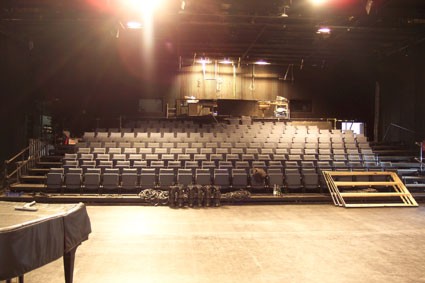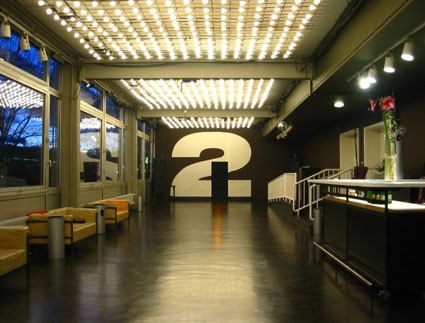2007 | Berlinale Talents
Longing for the World
"The necessity for filmmakers to find their own path through the globalised film industry, is perhaps the most important thing that we can try to get across at the Campus." A talk with Dorothee Wenner on the Berlinale Talent Campus 2007: more intensive support of young talents, engagement for diversity in international film and the cinema as a place for political discourse.

In the summer you took over as director of the Campus. I imagine it’s a bit like moving into a new apartment: You’re happy that the previous tenant left a washing machine, but you’re annoyed that the old fridge is still there. What was your first impression at the Campus?
The Campus is still a very new project, but it’s also worth taking a critical look at the past. That should be applied to previous years and those yet to come: What worked and what was received well by the talents? Which formats haven’t perhaps reached full maturity? I found a lot that I think is great and there were several things which I wanted to think about in a new way. The move to the new venue in the Hebbel Theater provided the occasion to do just that. The space in HAU is somewhat smaller than in the Haus der Kulturen der Welt. Based on our experience from the last few years we decided to reduce the number of participants in order to be able to offer the talents even more intensive and more individualised attention. We would like to tailor our formats more precisely to what makes sense for the Campus participants and what they really need.
How will this individualised attention actually take form?
It starts with the assessment of applications. We look at each application very carefully and, if need be, take up contact with the applicants at a very early stage, if we believe that it would be worth it for them to apply for special programmes like the Script Doc Clinic or the Garage Studios. From the moment that the talents know that they’ll be taking part, we try to foster connections between them. Ideally, they can do it themselves over the website. Moreover, we also help them prepare for meetings with certain experts and in some cases we connect talents with experts as early as mid-January via our website.
More than merely meeting the expectations
We are fully aware that the talents come to the Campus hoping to meet famous, highly accomplished personalities and we make an effort to meet these expectations. But we also want to give them a little push. “Meet the expert” doesn’t just mean “meet your star”. It’s much more about offering the talents real help for their work through people with “specialist knowledge” – such as in the area of sales for documentary films or about the independent film scene in Japan or Argentina, or that know how to best use digital software for set design. We also want to inspire young filmmakers by suggesting ideas, topics and people they don’t yet know about or couldn’t know about.
I find the concept of the “enlightening institution”, which Dieter Kosslick likes to use in this context, very fitting. While the term is 200 years old, it describes how for us it is on the one hand about providing the talents with what they expect from the Campus, but on the other hand about offering them things they could not know beforehand and which, hopefully, they will find great in retrospect.
Besides the practical changes that accompanied the move to the Hebbel am Ufer Theater, does the location bring with it another type of inspiration, because it has a very open, alternative and political image?
It was a good starting point that events in a similar spirit take place in the HAU throughout the year and that we are very welcome there. I also hope that the proximity of the new venue to Potsdamer Platz will integrate the Campus into the festival in an even more dynamic way.
What immediately comes across as positive for us is that there are three theatres that are each very different architecturally speaking. The HAU1 with its classical theatre architecture is ideal for the large lectures by renowned guests, where most of the action will take place on stage. The atmosphere of HAU2 encourages the open exchange of ideas. There you can easily organise a workshop at a large table with room for 40 or 50 people. In HAU3 there are three floors: the Garage Studio, the Script Doc Clinic and Editing Suites will be installed here.

HAU2 theatre
Hands-on films and politics
Everything taking place in HAU3 will be hands-on, concentrated and practical. Here you’ll wear your imaginary blue collar. And even if it’s just for one day, because we don’t want the “hands-on” activities to cut the talents off from the rest of the Campus.
What sort of projects will the Garage Studio be focused on?
The format has been designed for fast production for fast release on the Internet. The Garage Studio is the “replacement model” in our programme for the “Talent Movies of the Week”, which was more focused on the production of “classic” short films for cinema screening. The area of films produced solely for digital viewing in the Net is still virgin territory – also for us. As we speak countless such films are already being made, but it’s still totally unclear how the professional film industry should react to the phenomenon.
What does the sentence “Today anyone can make films” mean for professional filmmakers? What position should one take? Do you distance yourself? Or develop formats and narrative structures for young people that prefer sitting in front of a monitor to sitting in the cinema because they love interactivity. The younger generation is very media-savvy and want to be challenged in a totally different way when they go to the cinema. In the Garage Studio we want to connect practical teamwork on real life projects with critical self-questioning: What are we actually doing here and for whom? What will the cinema of the future look like? How is the gaming industry influencing narrative structures? I think this is an absolutely exciting challenge.
The upcoming Campus is dedicated to the theme of production conditions. On the one hand, there is strong tendency worldwide towards uniformity, with regards to aesthetics and marketing. On the other hand films are produced under very different conditions, depending on where they are created. Would you say that the Campus 2007 deals with the problems of globalisation?
Yes, definitely. That’s a central aim and I personally believe, too, that it’s the most important issue today. I want to illustrate that with an example. At the festival in Pusan I recently met Chalida Uabumrungjit, festival director in Bangkok. She told me that “pitching” marked a cultural gap that a lot of talented filmmakers from Southeast Asia couldn’t cross. “Pitching” is a practice that was developed in America and England and which is totally anchored in the Western world. But independent of how well that might function in our contexts, Chalida said that filmmakers in Southeast Asia were confronted with huge inhibitions, even fear when it came to “pitching”.
Add to that the hurdle that English is the only language of conversation. That is also an insurmountable barrier for many Campus applicants, especially for many Asian filmmakers. We’re in two minds about it: On the one hand we are committed to fostering greater diversity, in that we make an effort for talents from disadvantaged regions of the world. On the other hand we reproduce the exclusionary criteria of “English”- to which there is no alternative, since communication amongst the talents is our most important goal.

HAU2 lobby
Finding one's own path
Exporting the Campus idea to other continents – Cape Town, Delhi, Buenos Aires – also contributed to diversity. Will more work be done in this area?
Yes, intensively. For the Campus at the Sithengi Festival in Cape Town (November 14-21), the Goethe Institute in coorperation with us provided 15 scholarships, which made possible the participation of young talents from other African countries at the Campus in South Africa. Applicants from central African countries face the additional hurdle that, despite our support, they often cannot afford the application and participation in the Talent Campus.
The upcoming Campus apparently wants to embolden young filmmakers and producers to tell their own stories and help them search for individual strategies: There will be workshops on alternative channels of distribution, an event with representatives or “film collectives”, a panel discussion on the chances that “small”, local stories have in the global market. Is it all about countering globalisation with regional or even personal notes?
The events you mentioned have different aims – but yes, you’re right. The necessity for filmmakers to find their “own path” through the globalised film industry, is perhaps the most important thing that we can try to get across at the Campus. Yet there are no ready-made solutions, at best inspiration and, in most cases, pragmatic offers of help. For example, if we point to possibilities that could be interesting in certain “cinematographical crisis situations”. As in Africa: Even if there are virtually no cinemas on the continent anymore – with the exception of the Arab region and South Africa – there are still channels via which films reach their audience.
At other events, it’s more about instilling the talents with courage. The story of how last year’s Golden Bear winner Grbavica by Jasmila Zbanic was made is in many ways a very good example of this. When Jasmila talks about how she made this film, she can only impress and inspire the talents: This woman realised a very personal project under very difficult conditions. She fought against enormous obstacles and was finally rewarded for it with worldwide acclaim and awards. Jasmila persevered, often without following what it says in the textbooks. There are many such examples. Films that achieved success through an outsider strategy. You can’t copy this strategy but you can let yourself be inspired by it. Because there are a lot of films that can only be made once. And we want to give people the confidence to make these films.
In this situation it has become ever more important to get encouragement from the experiences of others. From independent initiatives such as the coop99 in Austria, Amri Muhammad from Malaysia or the project “women make movies” in New York. The Campus title “Home Affairs” is supposed to emphasise exactly this: How important it is today to build up a home base that allows you to survive as a filmmaker. It’s very exciting to be able to create the right conditions to work. And this applies to everyone, not just the very young.
Sustainable concepts for the “white areas” on the world film map
Empowering yourself as a filmmaker is also a very political topic. Not just because it might mean going against dominant trends, but also because it’s about giving yourself a voice.
That’s true. I suggest the following experiment: Take a map of the world and draw the current situation of the film industry using three colours: One colour for the few countries where the film industry can support itself. One colour for the countries where the film industry survives thanks to a culture of subsidies. And white for all countries in which you can’t talk about any kind of structure any more. Nearly the entire African continent would be white, with the exception of South Africa and a few states in the north. Comparable situations exist in Central Asia and several countries in Latin America. The white area has become frighteningly large.
How should we deal with this? For some time now, we’re in contact with an initiative in Congo which is trying to document the drastic changes taking place in the country right now. Just to be able to make films featuring characters and stories, which people from Nigeria or Congo can identify with, this already has political significance, especially considering power relations on the film market. Characters who live in comparable houses, wear similar clothes, speak a language that the other people understand, and at grips with issues the audiences can identify with, instead of the irrelevant problems of a pilot in Florida. There are more and more regions that are only served up generic mass market products. That’s not just a problem of US hegemony – other countries are also flooding the market with similar products.
One of the panel discussions at the upcoming Campus will ask if the cinema is a place where you can lead political discourse today. What’s at stake with this question? If it turns out that the answer is “yes” would you welcome that?
I think it’s good when political debates take place in the cinema. Not in the sense that one should have a discussion about old-age insurances and auxiliary wage costs after the film. But in the mass media certain regions of the world receive only very limited attention: As a background for animal documentaries, in relation to tourism, or when an earthquake or other natural disaster takes place and the Army is sent in to help. If you don’t have this limited connection, you don’t hear anything about their reality. The greater this deficit is, the more Berlinale audiences are interested in films from these regions.
Festivals play an important role in maintaining diversity. Here, people place especially high expectations on the Berlinale. It’s not enough to write on banners how many “exotic countries” we have in the programme. We have to come up with concepts that develop lasting structures. To offer platforms, develop marketing strategies, as it is happening with the Berlinale Co-Production Market and the World Cinema Fund. And for the Berlinale Talent Campus supporting the “white areas” on the world film map means deliberately inviting talents from there and to support them to realise their own projects in practical and moral terms. This is a task I have very much at heart.